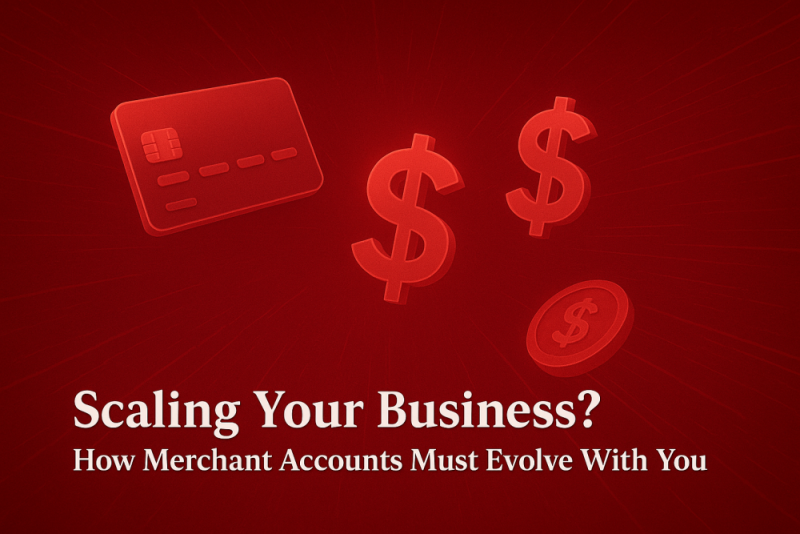Growing your business is exciting — but it also means your Merchant Account must grow with you. As your customer base, transactions, and global reach expand, your old payment setup might no longer be enough. This guide explains why your Merchant Account must evolve, what signs to look for, and how to future-proof your payment system for seamless growth.
What is a Merchant Account?
A Merchant Account is a dedicated type of account that allows your business to accept and process card and online payments. Funds from customer transactions are first deposited here before being settled into your business bank account.
It’s different from a normal business account because it:
- Handles transaction authorization and settlement.
- Includes security and fraud protection layers.
- Works with a payment processor or gateway to manage digital payments.
As your sales grow, this infrastructure must evolve — otherwise, you’ll face higher costs, delays, and compliance risks.
Why Merchant Accounts Matter More as You Scale
When your business starts small, any simple payment setup works. But as your transaction volumes, payment methods, and regions expand, you’ll face new challenges:
- Higher processing costs if you outgrow your provider’s fee model.
- Slower payouts due to reserve requirements or transaction limits.
- Increased fraud exposure with higher transaction volumes.
- Limited flexibility when adding new markets or currencies.
- Integration challenges with new platforms or CRMs.
Scaling successfully means upgrading your Merchant Account to match your business’s new financial demands.
Signs Your Merchant Account Is Limiting Growth
Recognizing early warning signs helps you avoid operational slowdowns:
- Frequent Payment Holds or Delays — processors flagging volume spikes.
- Rising Fees and Hidden Costs — non-transparent pricing at scale.
- Chargeback and Fraud Issues — weak protection against growing threats.
- Transaction Caps — hitting provider-imposed limits during promotions.
- Lack of Multi-Currency Support — struggles in cross-border sales.
- Integration Gaps — manual reconciliation and data sync issues.
If two or more apply, your Merchant Account likely needs an upgrade.
How Merchant Accounts Should Evolve With Your Business
Here’s how to keep your Merchant Account aligned with your growth:
1. Scalability & High-Volume Capability
Choose a Merchant Account built for high transaction loads. Look for:
- Custom transaction thresholds.
- Dedicated infrastructure.
- Dynamic settlement options.
- Volume-based pricing.
2. Enhanced Security & Fraud Management
As you scale, risk scales too. You need:
- AI-based fraud detection.
- PCI DSS compliance.
- 3D Secure & tokenization.
- Real-time chargeback alerts.
3. Multi-Currency & Global Expansion Support
Selling internationally? Your Merchant Account should offer:
- Local currency acceptance.
- Global acquiring partnerships.
- Multi-lingual checkout pages.
- Localized payment options (UPI, PayPal, cards, wallets).
4. Seamless API Integration
Modern businesses need payment systems that talk to everything:
- CRM & ERP integration.
- Webhooks for instant transaction alerts.
- Developer-friendly REST APIs.
- Real-time dashboards.
5. Transparent, Growth-Friendly Pricing
Avoid hidden charges. Choose providers that offer:
- Interchange-plus or volume-tier pricing.
- Flexible contracts.
- No penalties for scale-ups.
6. Regulatory Compliance
Your Merchant Account must evolve with compliance demands:
- KYC and AML checks.
- Data protection (GDPR).
- Cross-border tax compliance.
Choosing the Right Merchant Account Provider
Use this merchant provider checklist to ensure scalability:
| Criteria | Why It Matters |
| High-volume support | Handles growth without downtime |
| Multi-currency & local payments | Expands global sales |
| Fraud protection tools | Prevents chargebacks and losses |
| Transparent pricing | Keeps profits predictable |
| API & integration options | Enables automation |
| Fast settlements | Improves cash flow |
| 24/7 support | Critical for eCommerce uptime |
Pro Tip: Ask providers for case studies or references from businesses with similar transaction volumes and models.
Upgrading Your Merchant Account: Step-by-Step Plan
Here’s how to transition smoothly:
- Audit Your Current Setup
- Review transaction limits, currencies, integration needs, and customer geography.
- Set a Growth Forecast
- Estimate volumes, new markets, and payment types for the next 12–24 months.
- Identify Gaps
- Look for weak spots in fraud control, settlement time, and scalability.
- Shortlist Providers
- Evaluate features, fees, and compliance fit.
- Test Before You Commit
- Run pilot tests with partial transaction flow.
- Migrate Strategically
- Keep your old setup active during transition.
- Monitor & Optimize
- Track chargeback ratios, authorization rates, and payout times post-launch.
Common Merchant Account Mistakes to Avoid
- Ignoring global transaction compliance.
- Staying on entry-level accounts with capped limits.
- Not monitoring chargeback ratios.
- Choosing the cheapest provider instead of the most scalable one.
- Failing to negotiate terms as your volume increases.
Real Example: How a Retailer Scaled Seamlessly
A mid-sized eCommerce brand processing ₹50 lakh/month switched to a global Merchant Account provider offering:
- Multi-currency support.
- Automated fraud filters.
- 24-hour settlement cycles.
Within 3 months, the retailer expanded into 4 new countries and cut transaction costs by 18%. This demonstrates that the right Merchant Account isn’t just a necessity — it’s a competitive advantage.
Conclusion: Your Merchant Account Should Grow With You
As your business scales, your Merchant Account must keep up — ensuring faster payments, fraud prevention, and seamless integration across markets.
A future-ready Merchant Accounts helps you:
- Handle higher transaction volumes efficiently.
- Expand globally without payment friction.
- Maintain compliance and customer trust.
- Protect revenue from fraud and chargebacks.
👉 At The Finrate, we help businesses choose smarter payment solutions that scale with growth — not against it. Evaluate your setup today and make your Merchant Account the growth engine your business deserves.
